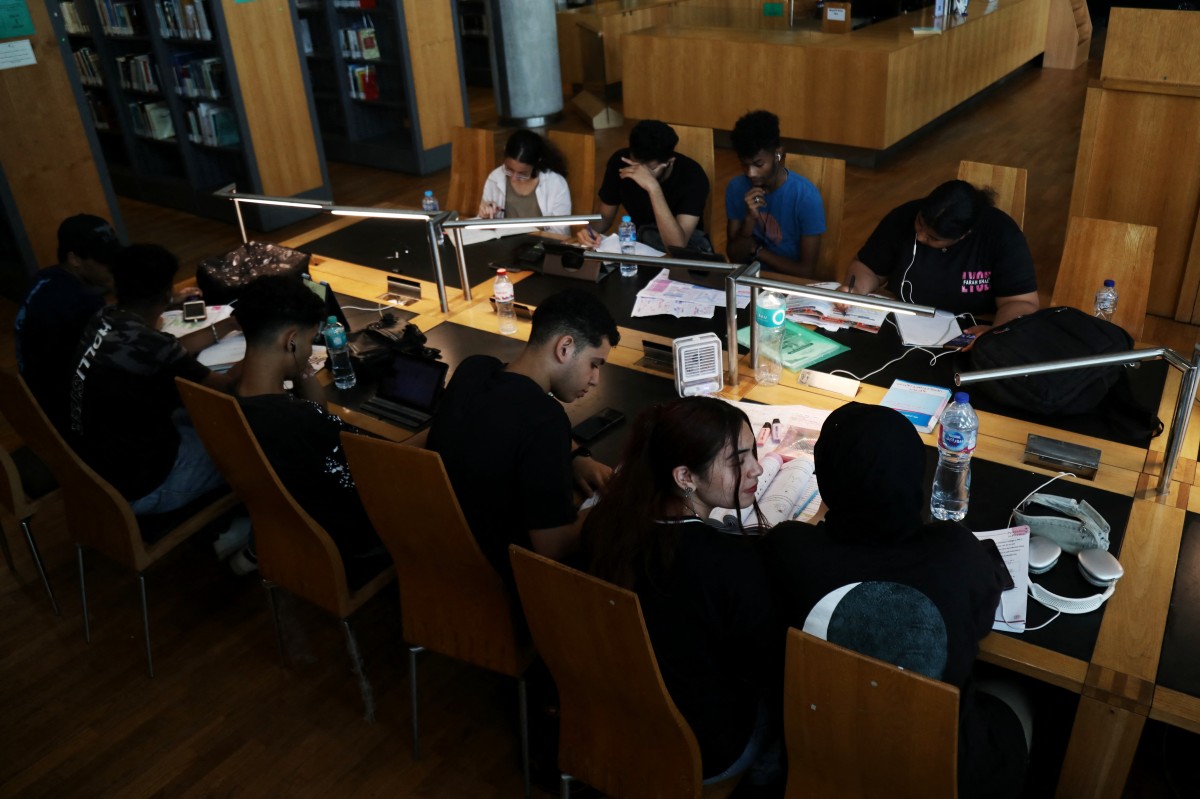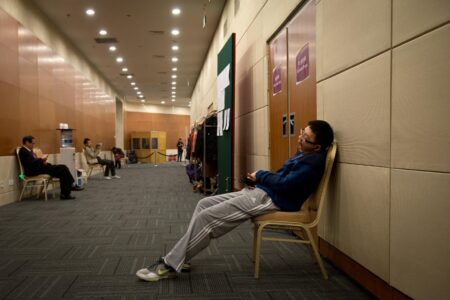
For decades, the dreaded all-nighter has been viewed as a fundamental pillar of the university student experience.
Visit any college campus library during exam season and you’ll most likely find students prepped to stay up all night glued to their books.
At least one library or study hall stays open on campus 24/7, accommodating scores of students who stay up all night to cram in revision for upcoming exams.
Most students probably know that depriving themselves of sleep is bad, but nonetheless, they’re willing to sacrifice sleep and, as a consequence, health, telling themselves it’s just for a short time and they can soon start sleeping 12 hours a day once the semester draws to a close.
But research shows that sleep is extremely important, not just during finals week but throughout the entire semester.

You’ll be hard-pressed to find a seat in the library during exam season, no matter the time of day. Source: AFP
It’s not just about getting sleep — it’s about getting good sleep
But besides pulling all-nighters, many students generally don’t know what it means to have a good sleeping routine.
Due to class schedules that differ daily, part-time jobs, extra-curricular, and social activities, students adapt to irregular sleep cycles that can seriously impact their academic performance as well as mental and physical health.
They tend to “make up” for the lack of sleep by laying in bed on weekends or days off, but this just makes the irregular cycle even worse.
A study by Brigham and Women’s Hospital shows how a regular bedtime significantly impacts sleep, not just the number of hours slept. The research measured sleep and circadian rhythms as well as the association to academic performance among college students.
Researchers studied 61 full-time undergraduate students from Harvard College over 30 days. Using sleep diaries, they were able to quantify sleep regularity using the SRI (sleep regularity index).
Then, the relationship between the SRI, sleep duration, distribution of sleep across the day, and one semester’s academic performance was examined by the researchers.
“Our results indicate that going to sleep and waking up at approximately the same time is as important as the number of hours one sleeps,” stated Andrew J. K. Phillips, PhD, Biophysicist at the Division of Sleep and Circadian Disorders, Brigham and Women’s Hospital, and lead author on the paper. “Sleep regularity is a potentially important and modifiable factor independent from sleep duration.”
The research found that students with more regular sleep patterns had better average school grades.
Regarding the average sleep duration, they found no significant difference between students with irregular sleep patterns and most regular sleepers.
This shows that it’s not always the hours of sleep you’re getting but rather the fact you’re not sleeping regularly that can affect your performance.

In this photograph taken on February 7, 2014, Indian students prepare for competitive exams in an open space of the City Central Library in Hyderabad. Students preparing for exams bring chairs and occupy the open space of the library, utilising the peaceful environment for uninterrupted study until 8 p.m. Source: AFP
Listen to your internal body clock
The study also shows that the circadian clock, better known as the body clock, was almost three hours later in students with irregular sleeping patterns.
“For the students whose sleep and wake times were inconsistent, classes and exams that were scheduled for 9 a.m. were therefore occurring at 6 a.m. according to their body clock, at a time when performance is impaired. Ironically, they didn’t save any time because, in the end, they slept just as much as those on a more regular schedule,” stated Charles A. Czeisler, PhD, MD, Director of the Sleep Health Institute at Brigham and Women’s Hospital, and senior author of the paper.
Also, melatonin was released 2.6 hours later among students with irregular sleeping patterns than those for whom sleep came more regularly. The timing of this melatonin release allowed researchers to assess the timing of circadian rhythms.
“Using a mathematical model of the circadian clock, we were able to demonstrate that the difference in circadian timing between students with the most irregular sleep patterns and students with regular sleep patterns was consistent with their different patterns of daily light exposure,” stated Phillips.
“In particular, regular sleepers got significantly higher light levels during the daytime, and significantly lower light levels at night than irregular sleepers who slept more during daytime hours and less during nighttime hours.”
The circadian clock is sensitive and takes time to adjust to changes in schedule. This is what causes jet lag and difficulty adjusting to a new bedtime.

Increased exposure to light during the daytime and less exposure to electronic light-emitting devices such as your phone right before bed can help improve your sleep patterns. Source: AFP
Another significant factor that contributes to the circadian clock is patterns of light exposure. Your body clock gets used to regular light exposure, so when exposed to different light exposure patterns at different times of the week, it tends to fall out of whack.
Irregular sleepers, who frequently changed the pattern of when they slept and consequently their pattern of light-dark exposure, experienced misalignment between the circadian system and the sleep-wake cycle.
This led researchers to conclude that light-based interventions may be effective in improving sleep regularity. This means increased exposure to light during the daytime and less exposure to electronic light-emitting devices (your phone, your iPad, or your computer) right before bed.
In summary, the study found that irregular sleep patterns and wakefulness correlated with lower GPA, delayed sleep/wake timing, and delayed release of melatonin — the hormone that promotes sleep.
So, avoid using your phone right before bed, as it can negatively affect your sleep. Also, try to go to bed and wake up at the same time every day to avoid messing up your body’s internal clock.
Avoid sleeping during the day to compensate for lack of sleep at night since this means less exposure to natural light, which is important for good sleep.
The academic consequences of not getting enough sleep, according to data
Although the above study found that bad sleeping patterns contribute to poor academic performance, there have been other studies on the effects of sleep deprivation as well.
A 2001 study by William E Kelly, Kathryn E Kelly, and Robert C Clanton found that sleep deprivation significantly affects students’ ability to perform well in class.
Their research found that people who slept for nine hours or more in a 24-hour period had much higher GPAs than those who slept for less than six hours in the same period.
Also, students who slept for less than six hours showed signs of anxiety, neurotic feelings, lack of creativity, and more prone to hallucination.
How sleeping helps with memory
So, how exactly do poor sleeping habits and sleep deprivation affect students’ academic performance?
Well, it’s not just about waking up late and missing a class, nor that they’re too tired to pay attention in lectures.
Many studies have shown that sleep is imperative to memory consolidation and cognition.
During “slow wave sleep”, which is one of the cycles the brain goes through during sleep, the brain replays information learnt while awake.
This leads to memory consolidation, in which information is stored in long-term memory. This means that if you don’t get enough sleep, your brain doesn’t have enough time to properly run through this cycle, leaving you unable to retain the information picked up the day before.
Then, in 2024, research revealed that sleep triggers the brain’s “reset switch” to make room for new memories the next day.
This revelation indicates that a burst of neural silence in a specific part of our brain — which occurs when we sleep — enables neurons that play a part in memory to rest and regroup for the next round of learning.
Imagine a nightly system reboot for the brain. This is what helps the brain file away information without causing a nerve-wracking overload to the neural networks responsible for memory.
So if you’re busy cramming and not sleeping, the information you learnt and thought you had memorised basically slips out of your brain, and you’ll have trouble recalling it the next day. You’ll also won’t be able to move on to the next revision topic, leading to an endless loop of frustration.

No student wants to fail even a year at school, so give yourself the best chance at succeeding in your studies by getting some quality shut-eye. Source: AFP
Good sleep, good grades
The truth is that pulling all-nighters and maintaining bad sleeping habits will be detrimental to your health.
Not getting at least seven to eight hours of sleep a night regularly has been shown to increase your risk of getting diseases like diabetes while also promoting weight gain and lower immune systems.
It might just be the cause of the freshman fifteen — a stage that sees many students gain weight during their first year of study.
Most students know it’s not good for them, but continue to burn the midnight oil and sleep at odd hours, sacrificing their health for the unstable promise of good grades.
Students who don’t put sleep high up in their priorities aren’t actually doing themselves any favours. And as results day looms, they could find their sacrifice has been for nothing.
So, here’s our advice: start maintaining good sleeping habits, and you’ll find yourself more alert in class and able to retain information. You might find yourself getting better grades and feeling less anxious.
Plus, your health and weight are far less likely to suffer!
Disclaimer: This article was last updated on November 22, 2024.










